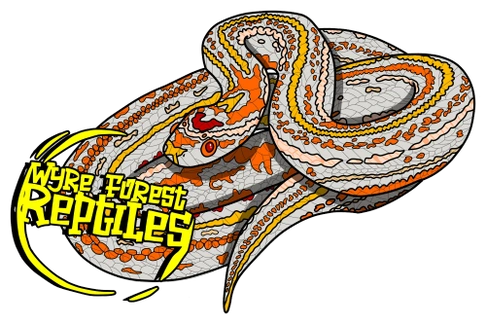Corn Snake Care
Pantherophis guttatus
Native Country: Southeast / Central America
Adult size: 4-6ft
Longevity: 15-20+ years
Housing
We start babies off in 1.3L Braplast tubs or similar sized boxes, this ensures the snake feels secure and is therefore more likely to eat. As they grow you can slowly move them up into bigger tubs, we use 3L Braplast tubs for our juvenile’s and find they work very well. Once they are adults you can either continue housing them in tubs or move them into a vivarium. If keeping them in tubs, a V35 tub is an ideal size. A 2 or 3 foot vivarium will also be perfect if you wish to house your snake that way.
Substrate
So what substrate should you use on the bottom of your vivarium / tub? You have several choices, these are listed below, along with any advantages and disadvantages of each one.
Chipsi / Super Tierwohl – we use these for hatchlings and juveniles, easy to clean and the snakes can burrow. Helps mask any smell.
Aubiose – We use this for adults, easy to clean and the snakes can burrow. Helps mask any smell.
Heating
Corn snakes are cold blooded like all reptiles and need to be provided with the correct temperatures within their caging to allow them to thrive. An ambient temperature of around 70°f (21°c) is perfect, with a hot basking spot of 80-84°f (27-28.5°c).
Heatmat: A heatmat is the easiest way to provide your snake with a warm end when kept in a tub, you should use a heatmat which covers about 1/3 of your tub floor space, and place it right at one end. When using a wooden vivarium we would recommend the use of alternative heating described below. When using a heatmat, you can use a pulse thermostats to control it, we can recommend Habistat or InkBird thermostats. Make sure your thermostat probe is placed on top of your heatmat, this will allow you to accurately control how warm your warm end gets. You now need a digital thermometer (with a probe, or an infra red gun) to measure how warm it is getting and adjust the thermostat as needed. Please do not use the analogue thermometers as they are not accurate.
Heat lamp: You may also use a heat lamp to provide your basking spot if using a vivarium. You again need to set this up at one end of the vivarium and set it up just like you did a heat mat. The only difference is that you need to use a dimming thermostat. This type of thermostat dims down the bulb to create the correct temperature, a normal thermostat would turn it on and off, creating a disco and shortening the life of your bulb! Depending on the size of your vivarium and how warm the room you are housing them in is, you may have to try different wattage bulbs to find one which works best, however 40W / 60W is normally ok. Remember to check your temperatures carefully with a digital thermometer though. Make sure any bulbs are guarded to prevent burns.
Lighting
No UV is required for a corn snake, however UV is beneficial.
Diet
Hatchlings should be fed on a defrosted / fresh killed pinkie mice every 5-7 days, as they increase in size the food size should also increase. A good guide to follow is the mouse should be no more than 1 and a half times the width of the snakes body. You may find you get to an in-between stage where the next size mouse looks too big but the current size doesn’t seem to take much to eat, at this point you can try 2 of the smaller size food. Adult snakes only need to be fed every 7-14 days.
